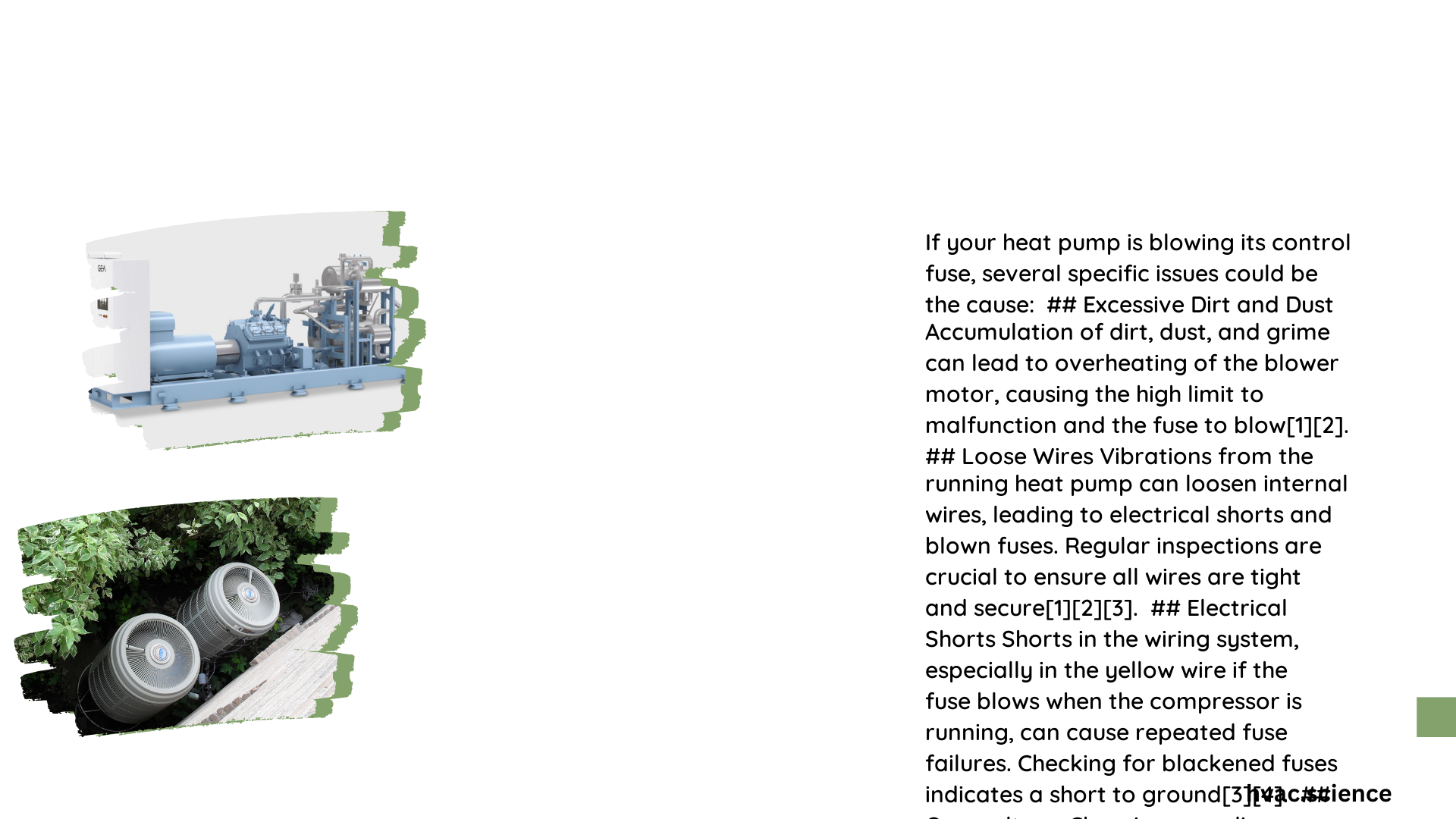A heat pump blowing control fuse is a common issue that can disrupt your home’s heating and cooling system. This problem occurs when the control fuse in your heat pump fails, often due to electrical issues, mechanical problems, or environmental factors. Understanding the causes, solutions, and prevention methods for this issue is crucial for maintaining a properly functioning heat pump system and ensuring your home’s comfort.
What Are the Common Causes of a Heat Pump Blowing Control Fuse?
Heat pump control fuses can blow for various reasons, ranging from simple electrical issues to more complex mechanical problems. Here are some of the most common causes:
- Electrical Issues:
- Overvoltage conditions
- Loose or damaged wiring
- Short circuits
-
Faulty transformers
-
Mechanical Problems:
- Failing blower motors
- Malfunctioning capacitors
-
Stuck or broken valves (in gas furnaces)
-
Environmental Factors:
- Low airflow due to dirty filters or blocked vents
- Accumulation of dirt and dust on components
- Water leaks or excessive moisture
How Can You Diagnose a Blown Control Fuse in Your Heat Pump?

Identifying a blown control fuse in your heat pump requires careful observation and some basic troubleshooting steps:
- Check for system unresponsiveness
- Listen for unusual noises
- Inspect the control panel for visible damage
- Use a multimeter to test the fuse continuity
What Steps Should You Take to Replace a Heat Pump Control Fuse?
Replacing a heat pump control fuse involves several steps:
- Turn off power to the heat pump
- Locate the control panel
- Identify the blown fuse
- Remove the old fuse
- Insert a new fuse with matching specifications
- Close the control panel
- Restore power and test the system
Caution: Always prioritize safety and consult a professional if you’re unsure about any step in the process.
Why Is Professional Assistance Recommended for Recurring Fuse Issues?
While replacing a blown fuse can be a simple DIY task, recurring fuse problems often indicate underlying issues that require professional attention:
- Expertise in diagnosing complex electrical problems
- Specialized tools and equipment for accurate testing
- Knowledge of heat pump system intricacies
- Ability to identify and address root causes
- Ensure safety and prevent further damage
How Can You Prevent Future Heat Pump Control Fuse Failures?
Preventing control fuse failures involves regular maintenance and proactive measures:
- Schedule annual professional inspections
- Clean or replace air filters regularly
- Keep the area around the heat pump clear of debris
- Address any unusual noises or performance issues promptly
- Ensure proper voltage supply to the system
What Are the Cost Implications of Heat Pump Control Fuse Replacement?
The cost of replacing a heat pump control fuse can vary depending on several factors:
| Item | Cost Range |
|---|---|
| Fuse | $5 – $20 |
| Professional Labor | $75 – $200 per hour |
| Additional Components | $50 – $500+ |
Note: Costs may vary based on location, system complexity, and specific issues encountered.
How Does a Blown Control Fuse Affect Heat Pump Performance?
A blown control fuse can have several impacts on your heat pump’s performance:
- Complete system shutdown
- Intermittent operation
- Reduced heating or cooling efficiency
- Increased energy consumption
- Potential damage to other components if left unaddressed
What Are the Signs of an Impending Control Fuse Failure?
Recognizing early warning signs can help prevent unexpected fuse failures:
- Frequent circuit breaker trips
- Unusual odors from the heat pump
- Inconsistent heating or cooling
- Strange noises during operation
- Visible wear or damage to electrical components
By understanding the causes, solutions, and prevention methods for heat pump control fuse issues, homeowners can better maintain their systems and ensure consistent comfort. Regular maintenance and prompt attention to any warning signs are key to avoiding costly repairs and prolonging the life of your heat pump.
References:
1. Acker Heating & Cooling
2. Sunset Heating & Cooling
3. Eza Comfort & Heat
